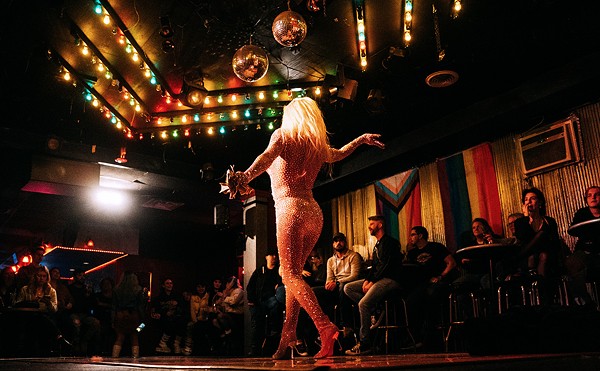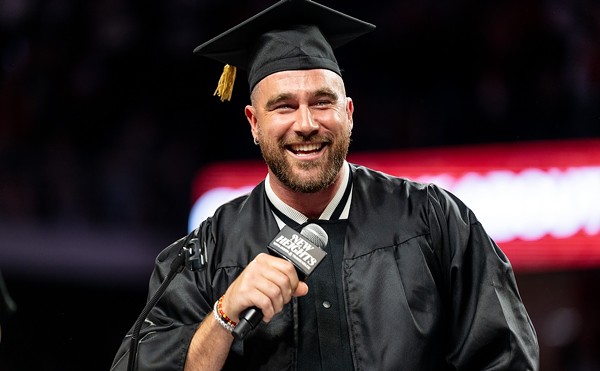|
Due in part to our complicated racial history in the United States, the African-American experience comes filtered through its engagement with mainstream culture and the greater society. What we, both African Americans and white folks, know about race stems from what the writers and curators of history and culture — mainly white men — tell us.
Yet an underground society of black folks exists, and has since the birth of this nation, that has created stories, documented the essence of black life and captured still and gloriously moving images of blacks and black society within the greater social fabric.
And it's intriguing how many of us, again both black and white, aren't familiar with either the images or the people behind the scenes. In a recent lively interview, local filmmaker Pamela Thomas, executive director of Black Folks Make Movies, Inc., explained how her own post-collegiate film study experiences back in the early 1980s in Boston led her to discover, for the first time, some of the roots of black cinema, particularly Oscar Micheaux.
"I didn't know who he was, but I sat and watched a screening of Body and Soul, Paul Robeson's first film," she says. "And the longer I sat there and watched, the angrier I got because I had just gotten out of school and I wanted to know why I didn't know who this person was. And then I thought maybe I could write a book about it," but she quickly dropped that notion because "I did not go to school to write book. I went to learn to make movies."
It took Thomas 10 years to develop the documentary Midnight Ramble: Oscar Micheaux & the Story of Race Movies, which will be presented at The National Underground Railroad Freedom Center 6:30-9 p.m.
Thursday.
What makes Midnight Ramble such an important link in the study of black cinema is that the film addresses the notion that black folks were making movies about the lives and struggles of black folks. We weren't sitting around waiting for white filmmakers, either more independent-minded or within the Hollywood studio system, to turn the spotlight on us.
"Michaeux is considered the dean of early black independent filmmaking and to this day, he is still the most prolific black filmmaker," Thomas says. "He made over 40 films, at least 40 that we know of."
But the evidence that brings home the real impact Micheaux and others had on cinema for black folks goes beyond the shout-outs those forebearers receive from contemporary filmmakers like Spike Lee and John Singleton. It is merely the fact that they went about the process of telling stories, their own stories as if that was simply what they were born to do at a time when they faced seemingly insurmountable social barriers.
"And at the time, I know they didn't know that they're doing something historic, but they were," Thomas says. "We can see that thread from then to now."
Yet race music and race films were always there, speaking to and about the African-American experience in a dialect that, at least initially, belonged to the race. And even within our internal dialogue, we look back with mixed feelings about some of those pivotal figures. Micheaux and comic icon Stepin Fechit paved the way for future generations, but history has not always fondly embraced their efforts.
Thus it's fitting that Midnight Ramble serves to remind us that questions remain as to whether or not we have emerged from the shadows of an industry that has intentionally overcooked our notions about race — especially during a presidential election process offering a black candidate whose presence challenges the nation to think that we might be approaching a post-racial landscape.
I ask Thomas to jump ahead 20 years and ponder the evolution of a project like Midnight Ramble. What or who would be the subject at that point, and she quickly mentions Barack Obama and Hillary Clinton. She sees the seismic effect they're having on electoral politics in the same context as Micheaux's impact on film.
History cannot deny their imprint, but it will still be necessary for black folks and women to make sure that their unique perspectives and voices on these figures are heard.
After the screening, Thomas and a panel featuring University of Dayton Entertainment Law Professor Dennis Greene and William Mallory Sr., Ohio's first African-American majority floor leader and 2008 Class of Great Living Cincinnatians, will take part in a Q&A session reflecting on early black cinema in Cincinnati, a noted sub-topic in Midnight Ramble.
MIDNIGHT RAMBLE screens at 6:30 p.m. Thursday at the National Underground Railroad Freedom Center. Admission is free. Get details and find nearby bars and restaurants here.





